Daily Vocabulary Words: List of Daily Used Words in Leading International Newspapers
Hi there. Welcome to this special section @ Wordpandit.
Our endeavour here is very simple: to highlight important daily vocabulary words, which you would come across in leading newspapers in the country. We have included the following newspapers in our selection:
• The New York Times
• The Washington Post
• Scientific American
• BBC
• The Guardian
• Psychology Today
• Wall Street Journal
• The Economist
We are putting in extensive work for developing your vocabulary. All you have got to do is be regular with this section and check out this post on a daily basis. This is your repository of words that are commonly used and essentially, we are posting a list of daily used words. Hence, this has significant practical application as it teaches you words that are used commonly in leading publications mentioned above.
Visit the website daily to learn words from leading international newspapers.
WORD-1: PRECIPITOUSLY
CONTEXT: some doctors are being forced to violate their conscience by being prevented from performing an abortion on patients whose precarious condition might decline precipitously without such a procedure.
SOURCE: New York Times
EXPLANATORY PARAGRAPH: Imagine standing on the edge of a really steep hill, where it goes down very sharply and quickly. That’s what “precipitously” means. It describes something that happens suddenly and very steeply, almost like it’s dropping off a cliff.
MEANING: Very steeply; in a precipitate manner (adverb).
PRONUNCIATION: preh-SIP-ih-tuh-slee
SYNONYMS: steeply, sharply, abruptly, suddenly, rapidly
USAGE EXAMPLES:
1. The path declined precipitously, making the hike quite challenging.
2. His popularity fell precipitously after the scandal.
3. She backed away precipitously from the edge.
4. Market prices dropped precipitously overnight.
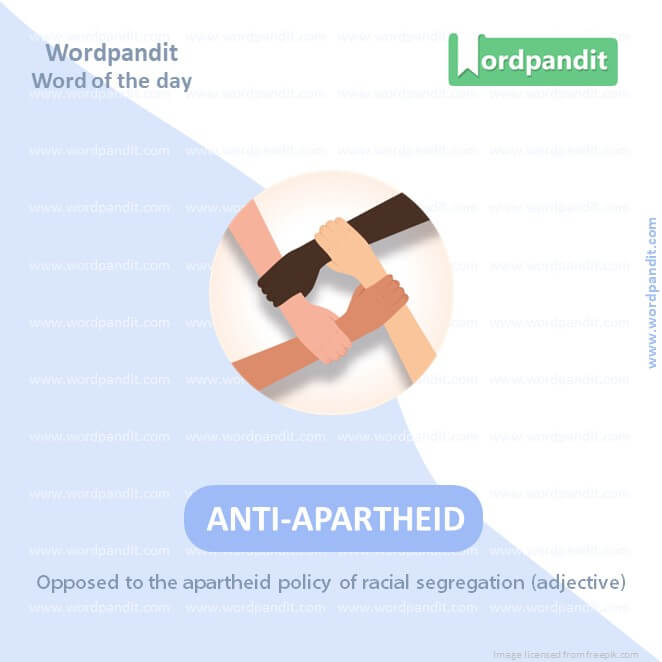
WORD-2: ANTI-APARTHEID
CONTEXT: He served as Columbia’s only Jewish president, from 1980 to 1993, and helped negotiate a peaceful end to weeks of anti-apartheid demonstrations.
SOURCE: New York Times
EXPLANATORY PARAGRAPH: Imagine a rule in school that was unfair to some students because of their hair color. If you and your friends spoke against this rule and tried to change it, you would be “anti-apartheid.” It means being against a system where people are separated and treated unfairly based on their race.
MEANING: Opposed to the apartheid policy of racial segregation (adjective).
PRONUNCIATION: AN-tee uh-PAR-tide
SYNONYMS: anti-segregation, anti-racism, anti-discrimination, equality-supporting
USAGE EXAMPLES:
1. He was a notable figure in the anti-apartheid movement.
2. The anti-apartheid protests helped to bring about change.
3. Many countries imposed sanctions as part of their anti-apartheid efforts.
4. She wrote several anti-apartheid pieces during the 1980s.
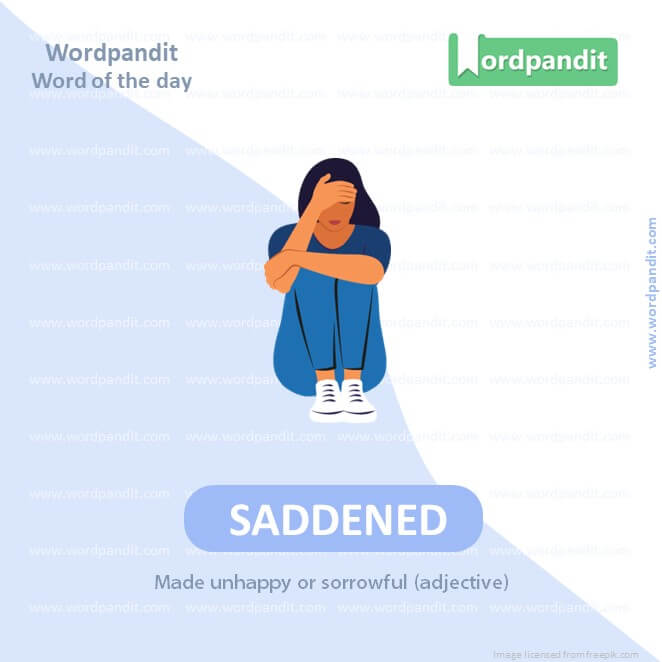
WORD-3: SADDENED
CONTEXT: We cannot know what our father, who died in 2020, would do if he were still president, but we have no doubt he would be deeply saddened by what is happening at the university that he loved and served for more than 60 years.
SOURCE: New York Times
EXPLANATORY PARAGRAPH: Imagine if your favorite toy broke and you felt really bad about it. That feeling is called being “saddened.” It means feeling sad or unhappy about something.
MEANING: Made unhappy or sorrowful (adjective).
PRONUNCIATION: SAD-und
SYNONYMS: sorrowful, mournful, heartbroken, melancholic, grief-stricken
USAGE EXAMPLES:
1. She was deeply saddened by the loss of her pet.
2. The news of the disaster saddened everyone in the town.
3. He was saddened that he could not attend the ceremony.
4. The community was saddened by the closing of the historic theater.
WORD-4: CONCOCTED
CONTEXT: It turns out that he and his fixer, Michael Cohen, working closely with David Pecker, the publisher of The National Enquirer, also concocted and released wholly untrue stories about his political opponents.
SOURCE: New York Times
EXPLANATORY PARAGRAPH: Imagine mixing different ingredients to make a secret potion or a special soup. That’s what “concocted” means. It refers to creating something by mixing various things together, often in a clever or secretive way.
MEANING: Made up (a story or plan), especially with the intent to deceive (verb).
PRONUNCIATION: kun-KOK-tid
SYNONYMS: devised, fabricated, invented, created, formulated
USAGE EXAMPLES:
1. He concocted a story about why he was late.
2. The chef concocted a new recipe for the competition.
3. They concocted a plan to surprise their friend on his birthday.
4. Rumors were concocted to discredit the official.
WORD-5: STIRRING
CONTEXT: We’ve seen movies aplenty in which a deeply flawed protagonist, someone we’d pretty much given up hope on, has a stirring of conscience or change of heart.
SOURCE: New York Times
EXPLANATORY PARAGRAPH: Imagine watching a movie or hearing a story that makes you want to stand up and cheer because it’s so exciting or emotional. That’s called “stirring.” It means causing great excitement or strong feelings.
MEANING: Causing excitement or strong emotion; rousing (adjective).
PRONUNCIATION: STUR-ring
SYNONYMS: exciting, moving, inspiring, rousing, thrilling
USAGE EXAMPLES:
1. The speech was so stirring that many people were moved to tears.
2. The stirring music lifted everyone’s spirits.
3. It was a stirring victory for the team.
4. The film’s stirring finale had the audience on their feet.
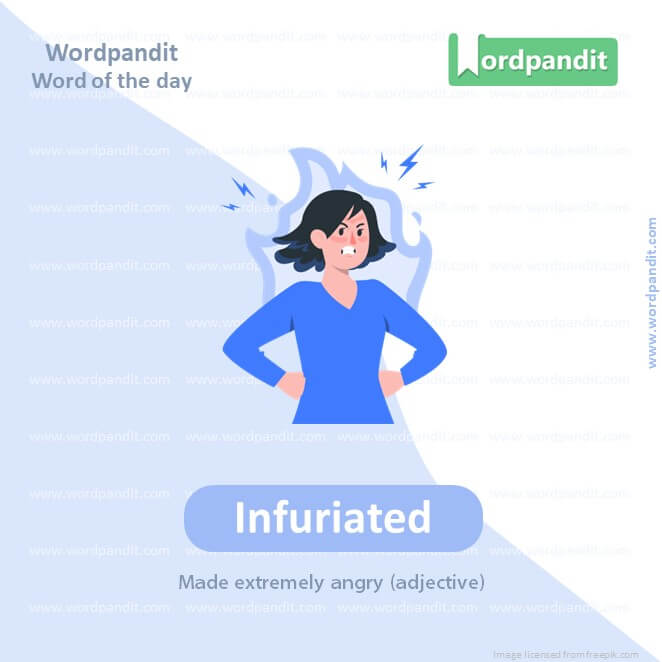
WORD-6: INFURIATED
CONTEXT: the House speaker, reversed a position that he’d previously held, banded with Democrats and infuriated some of the loudest, meanest, and most vengeful members of his party — that’s Marjorie Taylor Greene you hear wailing in the wings — to pass a $95 billion aid package for Ukraine, Israel, and Taiwan last weekend. We’ve read all about it.
SOURCE: New York Times
EXPLANATORY PARAGRAPH: Imagine if someone took your favorite toy without asking and then broke it. You might feel really, really angry. That strong feeling of anger is called being “infuriated.” It means being extremely angry about something.
MEANING: Made extremely angry (adjective).
PRONUNCIATION: in-FYOOR-ee-ay-tid
SYNONYMS: enraged, incensed, fuming, outraged, livid
USAGE EXAMPLES:
1. She was infuriated by the unfair decision.
2. The delayed response from the support team infuriated the customers.
3. He was infuriated by the rumors being spread about him.
4. The destruction of the park infuriated the local community.
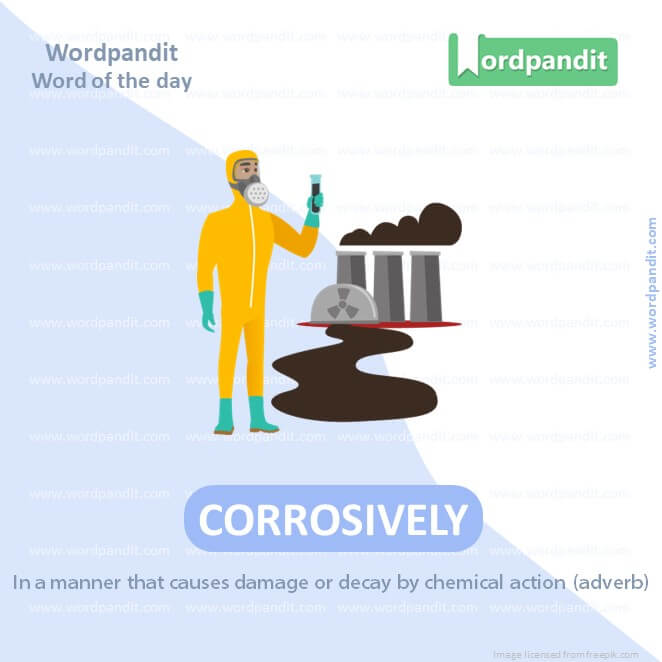
WORD-7: CORROSIVELY
CONTEXT: In an era this intensely and corrosively partisan, it’s especially important that we give warranted praise and appropriate thanks to people with whom we usually disagree.
SOURCE: New York Times
EXPLANATORY PARAGRAPH: Imagine a substance like vinegar that can wear away some metals over time. When something acts like this, damaging or destroying slowly, it’s being “corrosively.” It means in a way that causes corrosion, which can eat away or destroy things slowly.
MEANING: In a manner that causes damage or decay by chemical action (adverb).
PRONUNCIATION: kuh-ROH-siv-lee
SYNONYMS: destructively, harmfully, erosively, caustically, acidly
USAGE EXAMPLES:
1. The acid rain fell corrosively on the statue, damaging its surface.
2. His comments were corrosively critical, leaving everyone feeling belittled.
3. The saltwater corroded the metal corrosively.
4. Environmental pollutants can act corrosively on buildings and monuments.
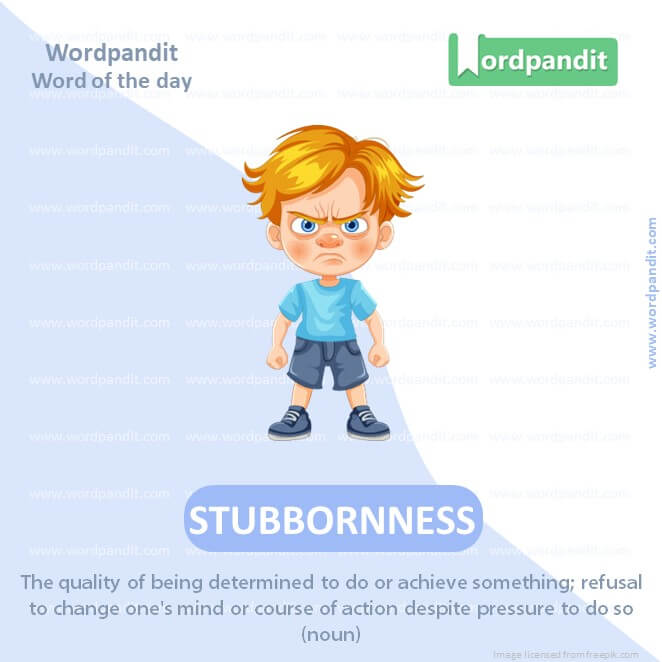
WORD-8: STUBBORNNESS
CONTEXT: Encouraging others to look beyond their stubbornness to the possibility of enlightenment.
SOURCE: New York Times
EXPLANATORY PARAGRAPH: Imagine trying to move a heavy rock that just won’t budge, no matter how hard you push. That rock is being “stubborn.” “Stubbornness” is when someone or something refuses to change their mind or move, even if there might be good reasons to do so.
MEANING: The quality of being determined to do or achieve something; refusal to change one’s mind or course of action despite pressure to do so (noun).
PRONUNCIATION: STUB-urn-ness
SYNONYMS: obstinacy, inflexibility, intransigence, tenacity, persistence
USAGE EXAMPLES:
1. His stubbornness prevented him from admitting he was wrong.
2. The stubbornness of the old lock made it difficult to open.
3. She admired his stubbornness in pursuing his goals.
4. Stubbornness can be a virtue or a vice, depending on the situation.
WORD-9: PROVENANCE
CONTEXT: Seeking more information. Not dismissing it out of hand because of its provenance.
SOURCE: New York Times
EXPLANATORY PARAGRAPH: Imagine you have a really old coin, and you want to find out where it came from and who owned it before you. The story of where it came from is called its “provenance.” It means the place of origin or earliest known history of something.
MEANING: The place of origin or earliest known history of something (noun).
PRONUNCIATION: PROV-uh-nans
SYNONYMS: origin, source, roots, derivation, history
USAGE EXAMPLES:
1. The provenance of the painting was finally traced back to a 16th-century artist.
2. Provenance research is important for museum acquisitions.
3. The artifact’s provenance was unclear, raising questions about its authenticity.
4. He collects books with well-documented provenance.
WORD-10: PREMONITIONS
CONTEXT: it’s an important counter to the very worst of our pessimism, a reminder not to let our premonitions of doom utterly consume us and become self-fulfilling prophecies.
SOURCE: New York Times
EXPLANATORY PARAGRAPH: Imagine having a strong feeling that something is going to happen, like knowing it might rain because the sky is very dark. This feeling about something in the future, especially if it’s a warning, is called a “premonition.” It’s like a hint or a feeling that something is going to happen before it does.
MEANING: A strong feeling that something is about to happen, especially something unpleasant (noun).
PRONUNCIATION: prem-uh-NISH-uns
SYNONYMS: forewarning, intuition, hunch, presentiment, inkling
USAGE EXAMPLES:
1. She had a premonition that something bad was going to happen.
2. His premonitions about the trip turned out to be correct.
3. She often trusted her premonitions and they rarely misled her.
4. The eerie calmness gave him a premonition of danger.
Vocabulary Pronunciation
The dance of language learning comprises two inseparable partners: vocabulary and pronunciation. The rhythm of this dance is best enjoyed when both partners are in sync. Essentially, mastering ‘vocabulary pronunciation’ is key to expressing and understanding a language effectively. However, what is the ideal approach to learn ‘vocabulary pronunciation’?
Firstly, the process of learning ‘vocabulary pronunciation’ isn’t a sprint. Rather, it’s a marathon where consistency is vital. A gradual and steady pace of learning new words and their pronunciation offers enough time to effectively practice and commit them to memory.
Secondly, to master ‘vocabulary pronunciation’, go beyond written text. Dwell in the world of audible language, such as documentaries, podcasts, music, or language-learning apps that provide pronunciation guides. These memorable auditory experiences aid in refining your ‘vocabulary pronunciation’ and offer a glimpse into the authentic sounds of the language.
Another beneficial strategy for learning ‘vocabulary pronunciation’ involves the use of phonetic transcriptions. They offer systematic approaches to understanding the sound system of a language, thereby improving pronunciation.
Most importantly, do not shy away from practicing your ‘vocabulary pronunciation’. Be it in a language exchange meeting, a conversation with a native speaker, or even a self-recording session, active verbalization massively boosts your pronunciation prowess.
Lastly, always remember to train your ears as much as you train your tongue. Listening carefully to native speakers helps you capture the subtleties of ‘vocabulary pronunciation’, contributing to better delivery when you speak.
In conclusion, mastering ‘vocabulary pronunciation’ is not an overnight journey. It’s a process of intentional practice, sustained listening, conscientious reflection and active usage. As you chart this course with diligence and patience, you will witness your ‘vocabulary pronunciation’ skills blossom, leading you to communicate with greater fluency and confidence.







